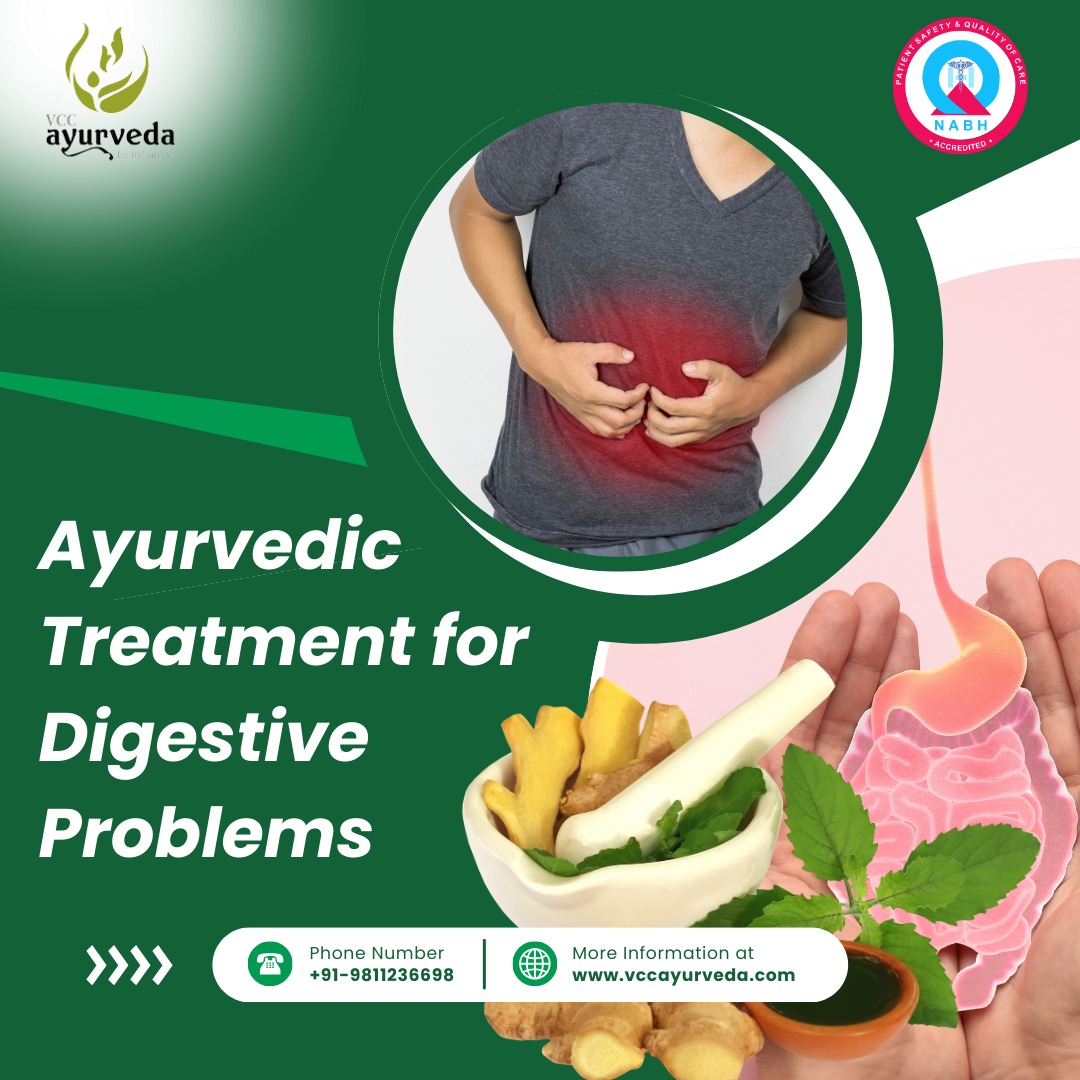04 Apr
By Admin
Understanding Digestive Health Through Ayurvedic Principles
Ayurvedic Treatment for Digestive Problems – Ayurvedic medication needs to be the best treatment strategy for gastrointestinal issues. Ayurvedic cures treat the invisible reason behind that condition. Generally, spices will not touch your digestive system, and this is the problem with most general medications. It will improve your overall well-being and prosperity which eventually results in your personal life. According to Ayurveda, you should include wholesome meals and eating habits that are suitable for your body type and disease. Food, when provided with proper care, might be used as medicine. Ayurvedic Treatment for Gastrointestinal Disorders/ Ayurvedic Treatment for Digestive Problems will help you manage and keep up control on stress.
Role of Digestion
Digestion breaks down food to provide energy to the body. The human body breaks the food inside it into a form that is digestible and assimilated as energy through the digestive process. Through digestion, your body retains some nutrients, and your digestive system removes waste. Our bodies need to have nutrients from food and water to function practically and stay healthy. Digestion is, therefore, the only access to those nutrients. The digestive system includes the mouth, pharynx, stomach, pancreas, liver, gallbladder, small intestine, intestines, and rectum. To be sure of what digesting implies, one has to know how these organs interact together to digest.
The digestive process begins in the oral cavity. Even before the act of eating, the prospect of eating increases salivary glands in the mouth. The digestive system performs three essential functions: mixing food, propelling food through the intestinal tract (peristalsis), and digesting food into smaller particles by using chemicals.
Common Digestive Disorders
Gastritis: It is an inflammation of the lining of the stomach.
Peptic ulcers: These are ulcers that occur within the lining of the stomach, the lower esophagus, or the first part of the small intestine.
Gastroesophageal reflux disease: Gastroesophageal reflux disease is a condition where stomach contents move backward or reflux into the esophagus.
Irritable bowel disorder: IBS is a form of gastrointestinal disorder that has been referred to as an idiopathic gut disorder.
Ongoing the runs: This is a term describing routine diarrheas for longer than about a month.
Blockage: You may experience a blockage if you have hard or small pellet-like stools, less than three times per week stools, or feel as if you have to strain to pass movement.
Fiery inside issues: Examples include inflammatory bowel diseases, such as Crohn’s disease and ulcerative colitis.
Entrail obstruction: It is the hindrance of the small or digestive organs. The obstruction may be partial but complete and prevents the passage of food and liquids through the digestive tracts, thus causing severe discomfort.
Ayurvedic Understanding of Gastrointestinal Disorders – Ayurvedic Treatment for Digestive Problems
In Ayurveda, the sad processing is called Agnimandya, that means a low stomach fire that cannot transform rasa into life-enriching Ojas. A low stomach fire is a cause of many illnesses but it also forms a medical condition in itself.
According to the Ayurvedic healing mechanism, it is our capacity to process whatever we absorb from our surroundings that determines our health and well-being. That too refers to actual food and drink items, but our perception, mood, or feeling received through our sensory gates, which are our eyes, ears, nose, tongue, and skin. Agni means, according to the Sanskrit language, “stomach fire”; it is that difference between the stuff we eat and our environmental surroundings which allows us to take in the good and let go of the bad.
Ayurveda distinguishes three types of Agni. They’re
- Jataragni (Agni present in the small digestive system and stomach)
- Mr. Bhutagni (Agni from fundamental five components)
- Dhathwagni (Agni present in each Dhathus)
Agni contrasts beginning with one individual then onto the next.
What might Ayurveda do to oversee stomach related issues?
Regular Reflection
Research is continually being done and proven to confirm the genetic changes occurring with regular reflection, which can also aid in rebalancing the body, including the processes that regulate metabolism. To fully appreciate meditation, do it for at least 20 to 30 minutes twice a day, once in the morning and once before sleep.
Do some form of daily movement
New research published in Diabetes Care reveals that forcing oneself to take a short, 15-minute walk after every meal lowers glucose spikes. Small post-dinner walks were more beneficial than one big, 45-minute walk a day.
Don’t Dine
Ayurveda suggests keeping a third to a quarter of our stomachs empty so that the body can digest the food properly.
The best time to consume the highest dinner is during the middle of lunch
The time that we just so happen to be lively within the daylight hours happens to be the body’s best time to digest all the meals. As performed by researchers, our digestive organs release most of the “digestive juices” during the early part of the day which is during lunch, making it the best time to have a heavy meal. Human bodies slow down and get ready to sleep at night. We would feel bloated and loaded and indeed likely to suffer from insomnia if we take our heaviest meal at dinner when our digestive fire is the weakest.
Ayurvedic cure for digestion related disorders
Panchakarma treatment processes enable you to cleanse the toxins or waste substances accumulated in your body. Panchakarma is an amalgamation of five detoxification processes (treated douche, medication induced vomiting, drug-activated purgation, and blood letting).
Detoxification techniques at Vcc Ayurveda strengthen your gastrointestinal system. Abhyangam (massage) and Sirodhara (flow of medicinal oil on the scalp) help reduce tension and enhance overall body metabolism. They will be available anywhere in Kerala, in any Ayurveda treatment center.
Spices that can be added to diet to prevent stomach problems include
- Lasunam(Garlic)
- Jaggery
- Sunti (Ginger)
- Jeerakam (Cumin)
- Dhanyakam (Coriander)
- Hingu (Asafoetida)
- Takram (Buttermilk)
These spices help in digestion, absorption, elimination, and tissue assimilation.


